Case Conceptualization and Treatment Plan: Nik Jones - Psychology
VerifiedAdded on 2023/04/23
|12
|3947
|183
Case Study
AI Summary
This case study focuses on Nik Jones, a 40-year-old Caucasian man experiencing anger outbursts, anxiety, and unresolved emotions related to his separation from his wife. The study details his history, including family background, developmental and social experiences, abuse/trauma history, educational and employment history, medical and psychiatric history, substance abuse, medication, and legal issues. The assignment emphasizes the application of Acceptance and Commitment Therapy (ACT) as a therapeutic approach. The case explores the impact of his wife's actions, legal issues, and personal struggles on his mental health. The analysis includes behavioral observations, presenting problems, and a psychosocial history, providing a comprehensive overview of Nik Jones's challenges and potential treatment strategies. The case highlights the importance of understanding the patient's background and applying appropriate therapeutic interventions.
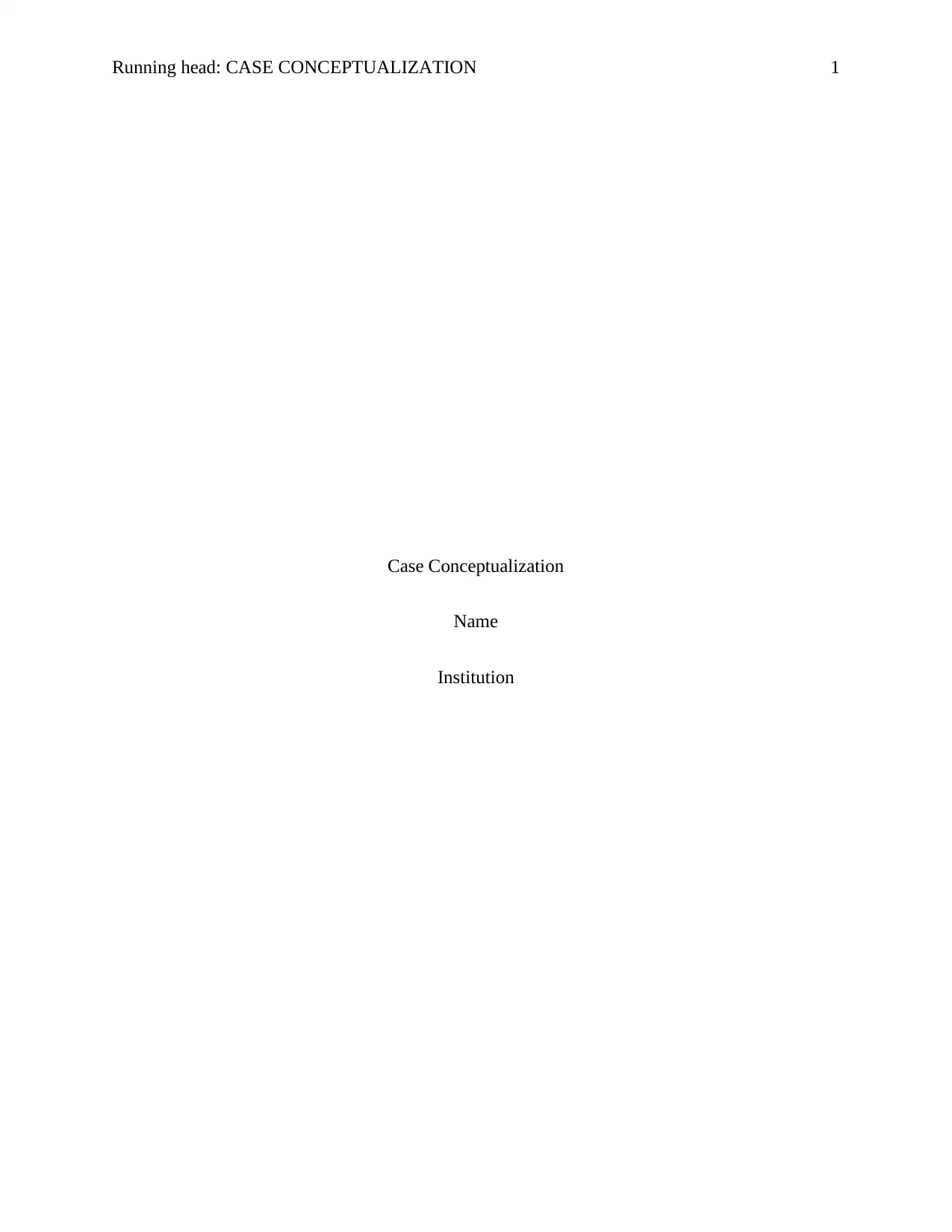
Running head: CASE CONCEPTUALIZATION 1
Case Conceptualization
Name
Institution
Case Conceptualization
Name
Institution
Paraphrase This Document
Need a fresh take? Get an instant paraphrase of this document with our AI Paraphraser
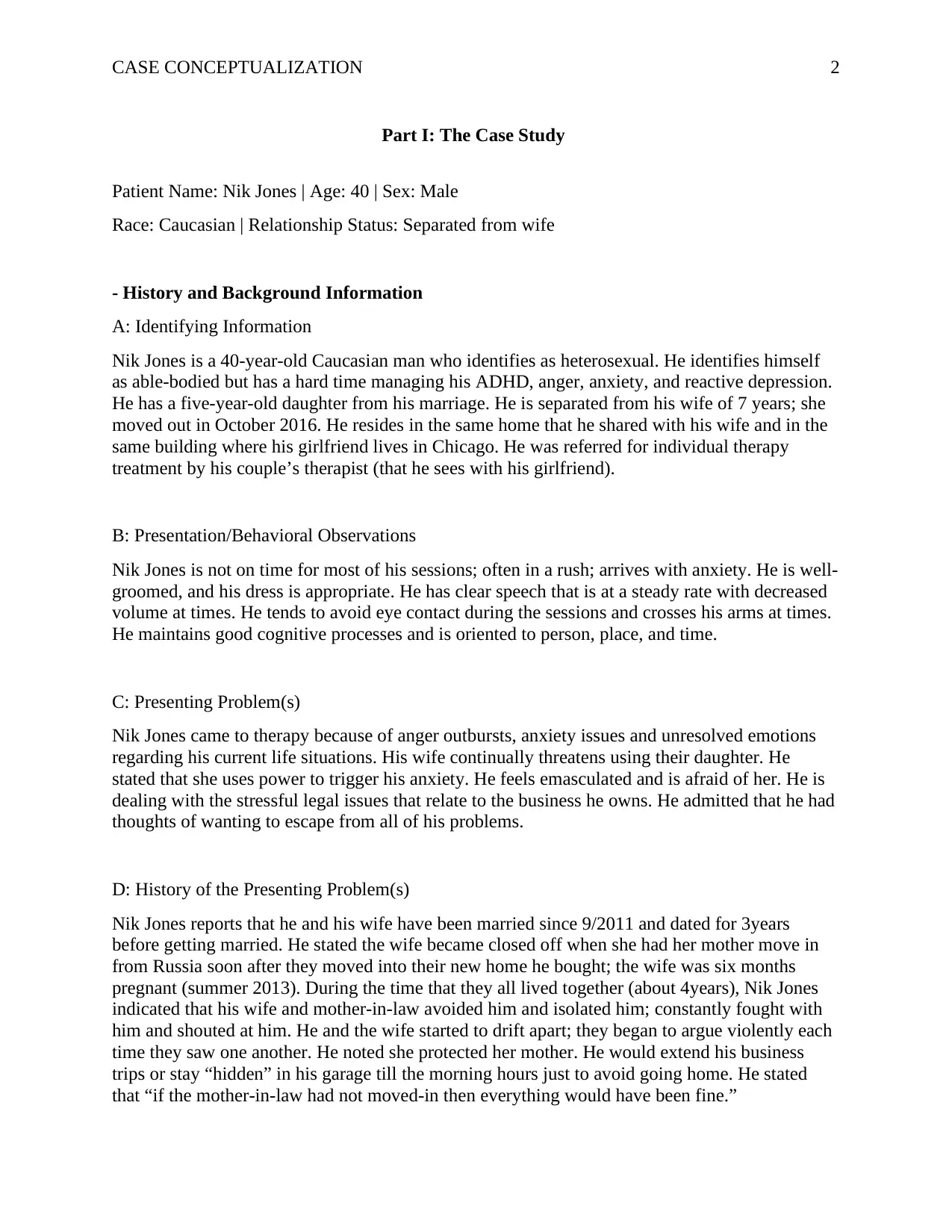
CASE CONCEPTUALIZATION 2
Part I: The Case Study
Patient Name: Nik Jones | Age: 40 | Sex: Male
Race: Caucasian | Relationship Status: Separated from wife
- History and Background Information
A: Identifying Information
Nik Jones is a 40-year-old Caucasian man who identifies as heterosexual. He identifies himself
as able-bodied but has a hard time managing his ADHD, anger, anxiety, and reactive depression.
He has a five-year-old daughter from his marriage. He is separated from his wife of 7 years; she
moved out in October 2016. He resides in the same home that he shared with his wife and in the
same building where his girlfriend lives in Chicago. He was referred for individual therapy
treatment by his couple’s therapist (that he sees with his girlfriend).
B: Presentation/Behavioral Observations
Nik Jones is not on time for most of his sessions; often in a rush; arrives with anxiety. He is well-
groomed, and his dress is appropriate. He has clear speech that is at a steady rate with decreased
volume at times. He tends to avoid eye contact during the sessions and crosses his arms at times.
He maintains good cognitive processes and is oriented to person, place, and time.
C: Presenting Problem(s)
Nik Jones came to therapy because of anger outbursts, anxiety issues and unresolved emotions
regarding his current life situations. His wife continually threatens using their daughter. He
stated that she uses power to trigger his anxiety. He feels emasculated and is afraid of her. He is
dealing with the stressful legal issues that relate to the business he owns. He admitted that he had
thoughts of wanting to escape from all of his problems.
D: History of the Presenting Problem(s)
Nik Jones reports that he and his wife have been married since 9/2011 and dated for 3years
before getting married. He stated the wife became closed off when she had her mother move in
from Russia soon after they moved into their new home he bought; the wife was six months
pregnant (summer 2013). During the time that they all lived together (about 4years), Nik Jones
indicated that his wife and mother-in-law avoided him and isolated him; constantly fought with
him and shouted at him. He and the wife started to drift apart; they began to argue violently each
time they saw one another. He noted she protected her mother. He would extend his business
trips or stay “hidden” in his garage till the morning hours just to avoid going home. He stated
that “if the mother-in-law had not moved-in then everything would have been fine.”
Part I: The Case Study
Patient Name: Nik Jones | Age: 40 | Sex: Male
Race: Caucasian | Relationship Status: Separated from wife
- History and Background Information
A: Identifying Information
Nik Jones is a 40-year-old Caucasian man who identifies as heterosexual. He identifies himself
as able-bodied but has a hard time managing his ADHD, anger, anxiety, and reactive depression.
He has a five-year-old daughter from his marriage. He is separated from his wife of 7 years; she
moved out in October 2016. He resides in the same home that he shared with his wife and in the
same building where his girlfriend lives in Chicago. He was referred for individual therapy
treatment by his couple’s therapist (that he sees with his girlfriend).
B: Presentation/Behavioral Observations
Nik Jones is not on time for most of his sessions; often in a rush; arrives with anxiety. He is well-
groomed, and his dress is appropriate. He has clear speech that is at a steady rate with decreased
volume at times. He tends to avoid eye contact during the sessions and crosses his arms at times.
He maintains good cognitive processes and is oriented to person, place, and time.
C: Presenting Problem(s)
Nik Jones came to therapy because of anger outbursts, anxiety issues and unresolved emotions
regarding his current life situations. His wife continually threatens using their daughter. He
stated that she uses power to trigger his anxiety. He feels emasculated and is afraid of her. He is
dealing with the stressful legal issues that relate to the business he owns. He admitted that he had
thoughts of wanting to escape from all of his problems.
D: History of the Presenting Problem(s)
Nik Jones reports that he and his wife have been married since 9/2011 and dated for 3years
before getting married. He stated the wife became closed off when she had her mother move in
from Russia soon after they moved into their new home he bought; the wife was six months
pregnant (summer 2013). During the time that they all lived together (about 4years), Nik Jones
indicated that his wife and mother-in-law avoided him and isolated him; constantly fought with
him and shouted at him. He and the wife started to drift apart; they began to argue violently each
time they saw one another. He noted she protected her mother. He would extend his business
trips or stay “hidden” in his garage till the morning hours just to avoid going home. He stated
that “if the mother-in-law had not moved-in then everything would have been fine.”
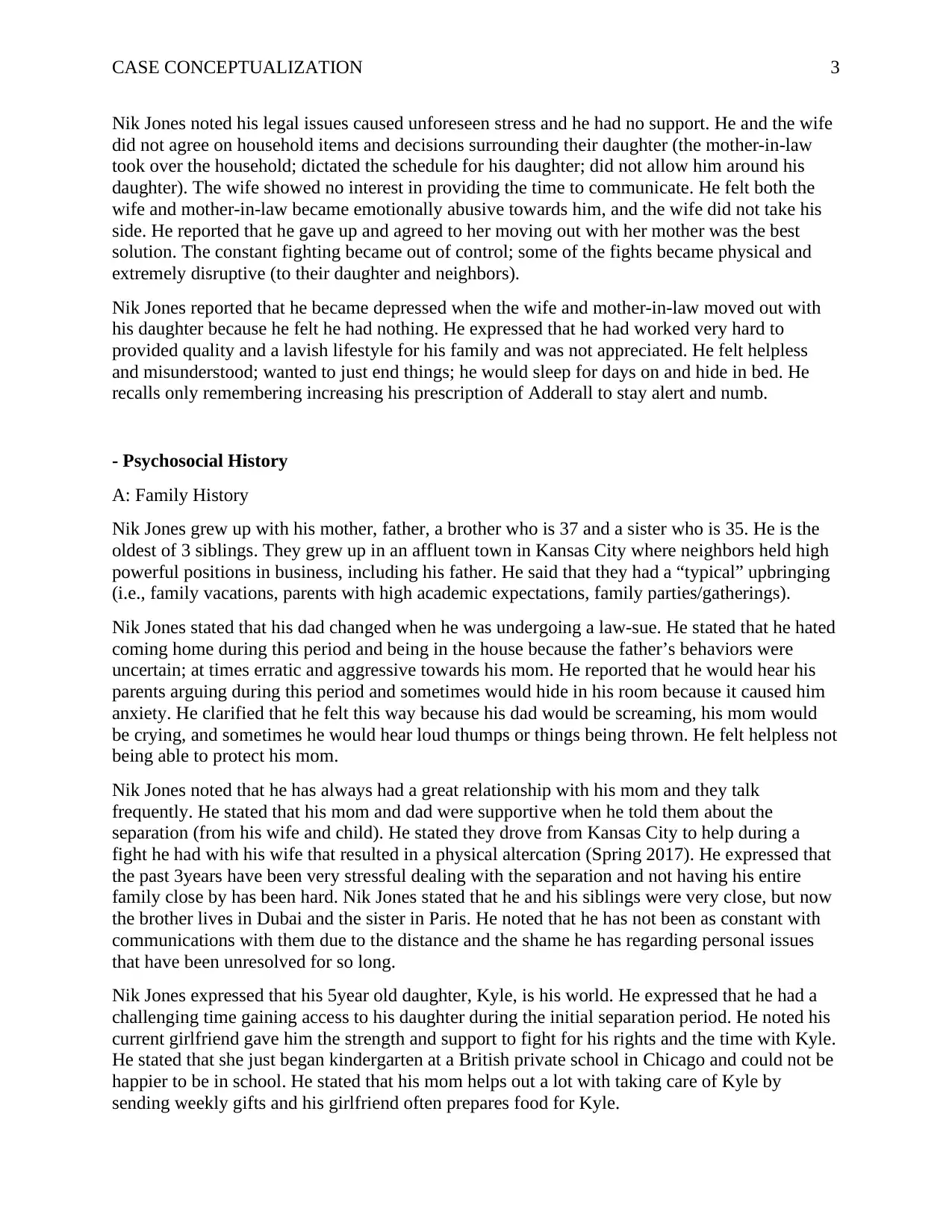
CASE CONCEPTUALIZATION 3
Nik Jones noted his legal issues caused unforeseen stress and he had no support. He and the wife
did not agree on household items and decisions surrounding their daughter (the mother-in-law
took over the household; dictated the schedule for his daughter; did not allow him around his
daughter). The wife showed no interest in providing the time to communicate. He felt both the
wife and mother-in-law became emotionally abusive towards him, and the wife did not take his
side. He reported that he gave up and agreed to her moving out with her mother was the best
solution. The constant fighting became out of control; some of the fights became physical and
extremely disruptive (to their daughter and neighbors).
Nik Jones reported that he became depressed when the wife and mother-in-law moved out with
his daughter because he felt he had nothing. He expressed that he had worked very hard to
provided quality and a lavish lifestyle for his family and was not appreciated. He felt helpless
and misunderstood; wanted to just end things; he would sleep for days on and hide in bed. He
recalls only remembering increasing his prescription of Adderall to stay alert and numb.
- Psychosocial History
A: Family History
Nik Jones grew up with his mother, father, a brother who is 37 and a sister who is 35. He is the
oldest of 3 siblings. They grew up in an affluent town in Kansas City where neighbors held high
powerful positions in business, including his father. He said that they had a “typical” upbringing
(i.e., family vacations, parents with high academic expectations, family parties/gatherings).
Nik Jones stated that his dad changed when he was undergoing a law-sue. He stated that he hated
coming home during this period and being in the house because the father’s behaviors were
uncertain; at times erratic and aggressive towards his mom. He reported that he would hear his
parents arguing during this period and sometimes would hide in his room because it caused him
anxiety. He clarified that he felt this way because his dad would be screaming, his mom would
be crying, and sometimes he would hear loud thumps or things being thrown. He felt helpless not
being able to protect his mom.
Nik Jones noted that he has always had a great relationship with his mom and they talk
frequently. He stated that his mom and dad were supportive when he told them about the
separation (from his wife and child). He stated they drove from Kansas City to help during a
fight he had with his wife that resulted in a physical altercation (Spring 2017). He expressed that
the past 3years have been very stressful dealing with the separation and not having his entire
family close by has been hard. Nik Jones stated that he and his siblings were very close, but now
the brother lives in Dubai and the sister in Paris. He noted that he has not been as constant with
communications with them due to the distance and the shame he has regarding personal issues
that have been unresolved for so long.
Nik Jones expressed that his 5year old daughter, Kyle, is his world. He expressed that he had a
challenging time gaining access to his daughter during the initial separation period. He noted his
current girlfriend gave him the strength and support to fight for his rights and the time with Kyle.
He stated that she just began kindergarten at a British private school in Chicago and could not be
happier to be in school. He stated that his mom helps out a lot with taking care of Kyle by
sending weekly gifts and his girlfriend often prepares food for Kyle.
Nik Jones noted his legal issues caused unforeseen stress and he had no support. He and the wife
did not agree on household items and decisions surrounding their daughter (the mother-in-law
took over the household; dictated the schedule for his daughter; did not allow him around his
daughter). The wife showed no interest in providing the time to communicate. He felt both the
wife and mother-in-law became emotionally abusive towards him, and the wife did not take his
side. He reported that he gave up and agreed to her moving out with her mother was the best
solution. The constant fighting became out of control; some of the fights became physical and
extremely disruptive (to their daughter and neighbors).
Nik Jones reported that he became depressed when the wife and mother-in-law moved out with
his daughter because he felt he had nothing. He expressed that he had worked very hard to
provided quality and a lavish lifestyle for his family and was not appreciated. He felt helpless
and misunderstood; wanted to just end things; he would sleep for days on and hide in bed. He
recalls only remembering increasing his prescription of Adderall to stay alert and numb.
- Psychosocial History
A: Family History
Nik Jones grew up with his mother, father, a brother who is 37 and a sister who is 35. He is the
oldest of 3 siblings. They grew up in an affluent town in Kansas City where neighbors held high
powerful positions in business, including his father. He said that they had a “typical” upbringing
(i.e., family vacations, parents with high academic expectations, family parties/gatherings).
Nik Jones stated that his dad changed when he was undergoing a law-sue. He stated that he hated
coming home during this period and being in the house because the father’s behaviors were
uncertain; at times erratic and aggressive towards his mom. He reported that he would hear his
parents arguing during this period and sometimes would hide in his room because it caused him
anxiety. He clarified that he felt this way because his dad would be screaming, his mom would
be crying, and sometimes he would hear loud thumps or things being thrown. He felt helpless not
being able to protect his mom.
Nik Jones noted that he has always had a great relationship with his mom and they talk
frequently. He stated that his mom and dad were supportive when he told them about the
separation (from his wife and child). He stated they drove from Kansas City to help during a
fight he had with his wife that resulted in a physical altercation (Spring 2017). He expressed that
the past 3years have been very stressful dealing with the separation and not having his entire
family close by has been hard. Nik Jones stated that he and his siblings were very close, but now
the brother lives in Dubai and the sister in Paris. He noted that he has not been as constant with
communications with them due to the distance and the shame he has regarding personal issues
that have been unresolved for so long.
Nik Jones expressed that his 5year old daughter, Kyle, is his world. He expressed that he had a
challenging time gaining access to his daughter during the initial separation period. He noted his
current girlfriend gave him the strength and support to fight for his rights and the time with Kyle.
He stated that she just began kindergarten at a British private school in Chicago and could not be
happier to be in school. He stated that his mom helps out a lot with taking care of Kyle by
sending weekly gifts and his girlfriend often prepares food for Kyle.
⊘ This is a preview!⊘
Do you want full access?
Subscribe today to unlock all pages.

Trusted by 1+ million students worldwide
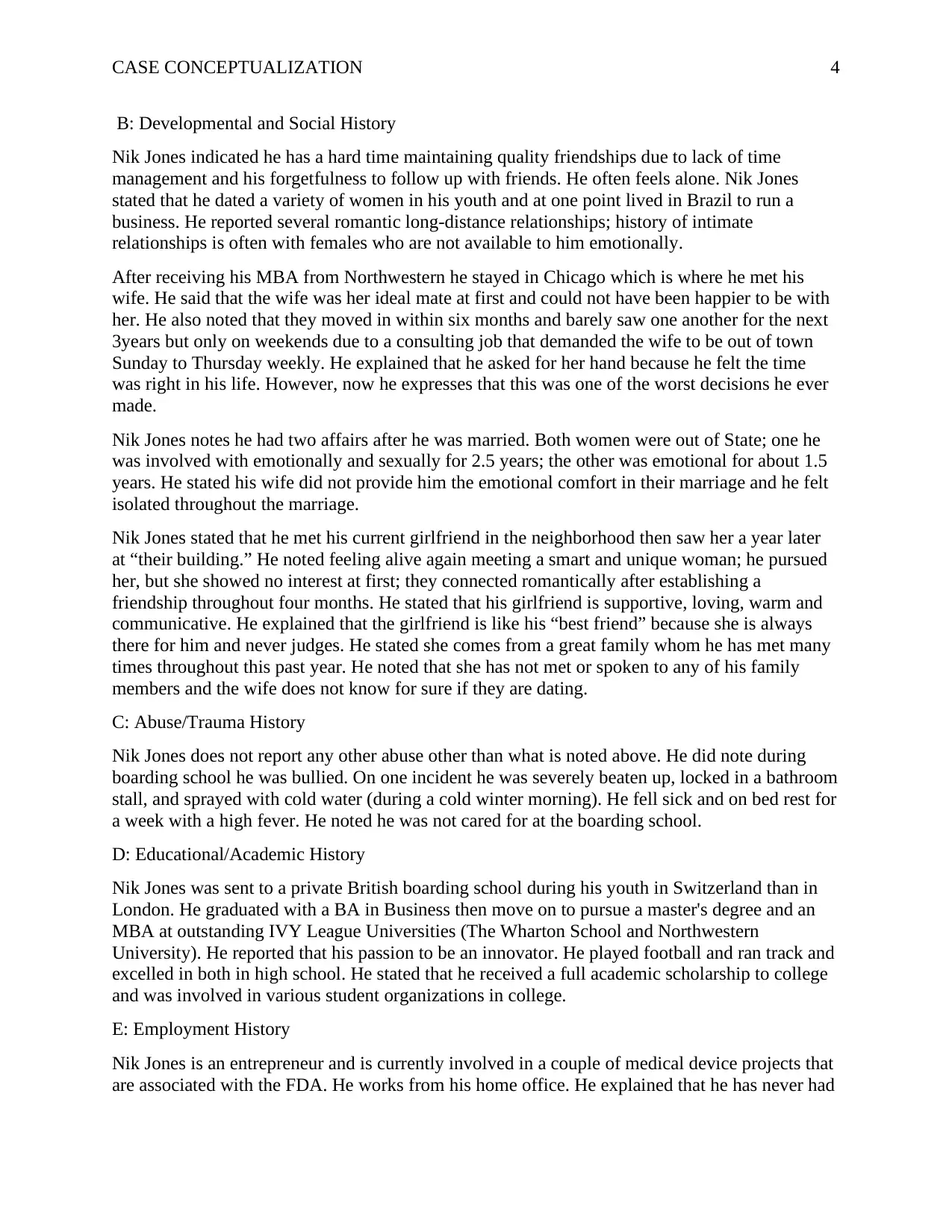
CASE CONCEPTUALIZATION 4
B: Developmental and Social History
Nik Jones indicated he has a hard time maintaining quality friendships due to lack of time
management and his forgetfulness to follow up with friends. He often feels alone. Nik Jones
stated that he dated a variety of women in his youth and at one point lived in Brazil to run a
business. He reported several romantic long-distance relationships; history of intimate
relationships is often with females who are not available to him emotionally.
After receiving his MBA from Northwestern he stayed in Chicago which is where he met his
wife. He said that the wife was her ideal mate at first and could not have been happier to be with
her. He also noted that they moved in within six months and barely saw one another for the next
3years but only on weekends due to a consulting job that demanded the wife to be out of town
Sunday to Thursday weekly. He explained that he asked for her hand because he felt the time
was right in his life. However, now he expresses that this was one of the worst decisions he ever
made.
Nik Jones notes he had two affairs after he was married. Both women were out of State; one he
was involved with emotionally and sexually for 2.5 years; the other was emotional for about 1.5
years. He stated his wife did not provide him the emotional comfort in their marriage and he felt
isolated throughout the marriage.
Nik Jones stated that he met his current girlfriend in the neighborhood then saw her a year later
at “their building.” He noted feeling alive again meeting a smart and unique woman; he pursued
her, but she showed no interest at first; they connected romantically after establishing a
friendship throughout four months. He stated that his girlfriend is supportive, loving, warm and
communicative. He explained that the girlfriend is like his “best friend” because she is always
there for him and never judges. He stated she comes from a great family whom he has met many
times throughout this past year. He noted that she has not met or spoken to any of his family
members and the wife does not know for sure if they are dating.
C: Abuse/Trauma History
Nik Jones does not report any other abuse other than what is noted above. He did note during
boarding school he was bullied. On one incident he was severely beaten up, locked in a bathroom
stall, and sprayed with cold water (during a cold winter morning). He fell sick and on bed rest for
a week with a high fever. He noted he was not cared for at the boarding school.
D: Educational/Academic History
Nik Jones was sent to a private British boarding school during his youth in Switzerland than in
London. He graduated with a BA in Business then move on to pursue a master's degree and an
MBA at outstanding IVY League Universities (The Wharton School and Northwestern
University). He reported that his passion to be an innovator. He played football and ran track and
excelled in both in high school. He stated that he received a full academic scholarship to college
and was involved in various student organizations in college.
E: Employment History
Nik Jones is an entrepreneur and is currently involved in a couple of medical device projects that
are associated with the FDA. He works from his home office. He explained that he has never had
B: Developmental and Social History
Nik Jones indicated he has a hard time maintaining quality friendships due to lack of time
management and his forgetfulness to follow up with friends. He often feels alone. Nik Jones
stated that he dated a variety of women in his youth and at one point lived in Brazil to run a
business. He reported several romantic long-distance relationships; history of intimate
relationships is often with females who are not available to him emotionally.
After receiving his MBA from Northwestern he stayed in Chicago which is where he met his
wife. He said that the wife was her ideal mate at first and could not have been happier to be with
her. He also noted that they moved in within six months and barely saw one another for the next
3years but only on weekends due to a consulting job that demanded the wife to be out of town
Sunday to Thursday weekly. He explained that he asked for her hand because he felt the time
was right in his life. However, now he expresses that this was one of the worst decisions he ever
made.
Nik Jones notes he had two affairs after he was married. Both women were out of State; one he
was involved with emotionally and sexually for 2.5 years; the other was emotional for about 1.5
years. He stated his wife did not provide him the emotional comfort in their marriage and he felt
isolated throughout the marriage.
Nik Jones stated that he met his current girlfriend in the neighborhood then saw her a year later
at “their building.” He noted feeling alive again meeting a smart and unique woman; he pursued
her, but she showed no interest at first; they connected romantically after establishing a
friendship throughout four months. He stated that his girlfriend is supportive, loving, warm and
communicative. He explained that the girlfriend is like his “best friend” because she is always
there for him and never judges. He stated she comes from a great family whom he has met many
times throughout this past year. He noted that she has not met or spoken to any of his family
members and the wife does not know for sure if they are dating.
C: Abuse/Trauma History
Nik Jones does not report any other abuse other than what is noted above. He did note during
boarding school he was bullied. On one incident he was severely beaten up, locked in a bathroom
stall, and sprayed with cold water (during a cold winter morning). He fell sick and on bed rest for
a week with a high fever. He noted he was not cared for at the boarding school.
D: Educational/Academic History
Nik Jones was sent to a private British boarding school during his youth in Switzerland than in
London. He graduated with a BA in Business then move on to pursue a master's degree and an
MBA at outstanding IVY League Universities (The Wharton School and Northwestern
University). He reported that his passion to be an innovator. He played football and ran track and
excelled in both in high school. He stated that he received a full academic scholarship to college
and was involved in various student organizations in college.
E: Employment History
Nik Jones is an entrepreneur and is currently involved in a couple of medical device projects that
are associated with the FDA. He works from his home office. He explained that he has never had
Paraphrase This Document
Need a fresh take? Get an instant paraphrase of this document with our AI Paraphraser
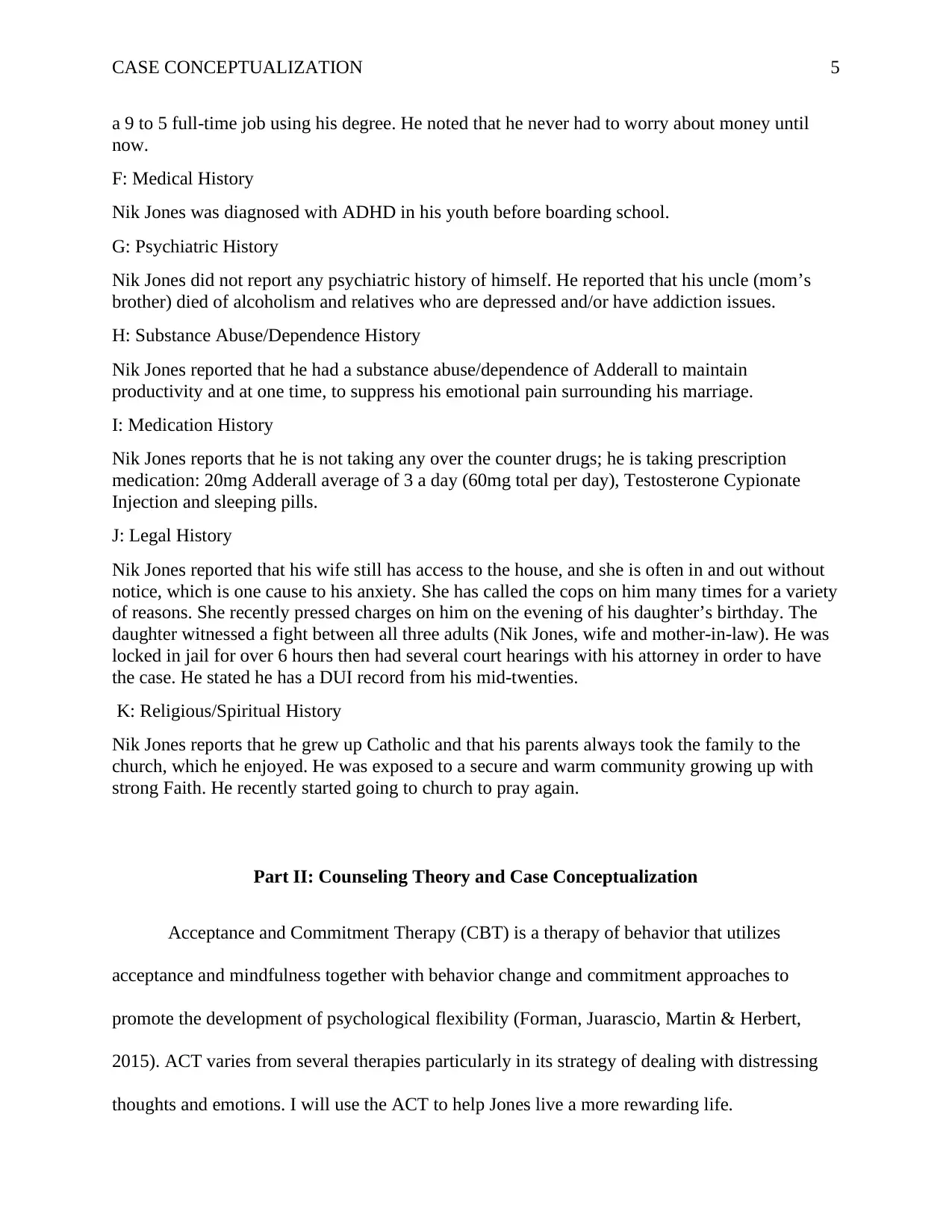
CASE CONCEPTUALIZATION 5
a 9 to 5 full-time job using his degree. He noted that he never had to worry about money until
now.
F: Medical History
Nik Jones was diagnosed with ADHD in his youth before boarding school.
G: Psychiatric History
Nik Jones did not report any psychiatric history of himself. He reported that his uncle (mom’s
brother) died of alcoholism and relatives who are depressed and/or have addiction issues.
H: Substance Abuse/Dependence History
Nik Jones reported that he had a substance abuse/dependence of Adderall to maintain
productivity and at one time, to suppress his emotional pain surrounding his marriage.
I: Medication History
Nik Jones reports that he is not taking any over the counter drugs; he is taking prescription
medication: 20mg Adderall average of 3 a day (60mg total per day), Testosterone Cypionate
Injection and sleeping pills.
J: Legal History
Nik Jones reported that his wife still has access to the house, and she is often in and out without
notice, which is one cause to his anxiety. She has called the cops on him many times for a variety
of reasons. She recently pressed charges on him on the evening of his daughter’s birthday. The
daughter witnessed a fight between all three adults (Nik Jones, wife and mother-in-law). He was
locked in jail for over 6 hours then had several court hearings with his attorney in order to have
the case. He stated he has a DUI record from his mid-twenties.
K: Religious/Spiritual History
Nik Jones reports that he grew up Catholic and that his parents always took the family to the
church, which he enjoyed. He was exposed to a secure and warm community growing up with
strong Faith. He recently started going to church to pray again.
Part II: Counseling Theory and Case Conceptualization
Acceptance and Commitment Therapy (CBT) is a therapy of behavior that utilizes
acceptance and mindfulness together with behavior change and commitment approaches to
promote the development of psychological flexibility (Forman, Juarascio, Martin & Herbert,
2015). ACT varies from several therapies particularly in its strategy of dealing with distressing
thoughts and emotions. I will use the ACT to help Jones live a more rewarding life.
a 9 to 5 full-time job using his degree. He noted that he never had to worry about money until
now.
F: Medical History
Nik Jones was diagnosed with ADHD in his youth before boarding school.
G: Psychiatric History
Nik Jones did not report any psychiatric history of himself. He reported that his uncle (mom’s
brother) died of alcoholism and relatives who are depressed and/or have addiction issues.
H: Substance Abuse/Dependence History
Nik Jones reported that he had a substance abuse/dependence of Adderall to maintain
productivity and at one time, to suppress his emotional pain surrounding his marriage.
I: Medication History
Nik Jones reports that he is not taking any over the counter drugs; he is taking prescription
medication: 20mg Adderall average of 3 a day (60mg total per day), Testosterone Cypionate
Injection and sleeping pills.
J: Legal History
Nik Jones reported that his wife still has access to the house, and she is often in and out without
notice, which is one cause to his anxiety. She has called the cops on him many times for a variety
of reasons. She recently pressed charges on him on the evening of his daughter’s birthday. The
daughter witnessed a fight between all three adults (Nik Jones, wife and mother-in-law). He was
locked in jail for over 6 hours then had several court hearings with his attorney in order to have
the case. He stated he has a DUI record from his mid-twenties.
K: Religious/Spiritual History
Nik Jones reports that he grew up Catholic and that his parents always took the family to the
church, which he enjoyed. He was exposed to a secure and warm community growing up with
strong Faith. He recently started going to church to pray again.
Part II: Counseling Theory and Case Conceptualization
Acceptance and Commitment Therapy (CBT) is a therapy of behavior that utilizes
acceptance and mindfulness together with behavior change and commitment approaches to
promote the development of psychological flexibility (Forman, Juarascio, Martin & Herbert,
2015). ACT varies from several therapies particularly in its strategy of dealing with distressing
thoughts and emotions. I will use the ACT to help Jones live a more rewarding life.
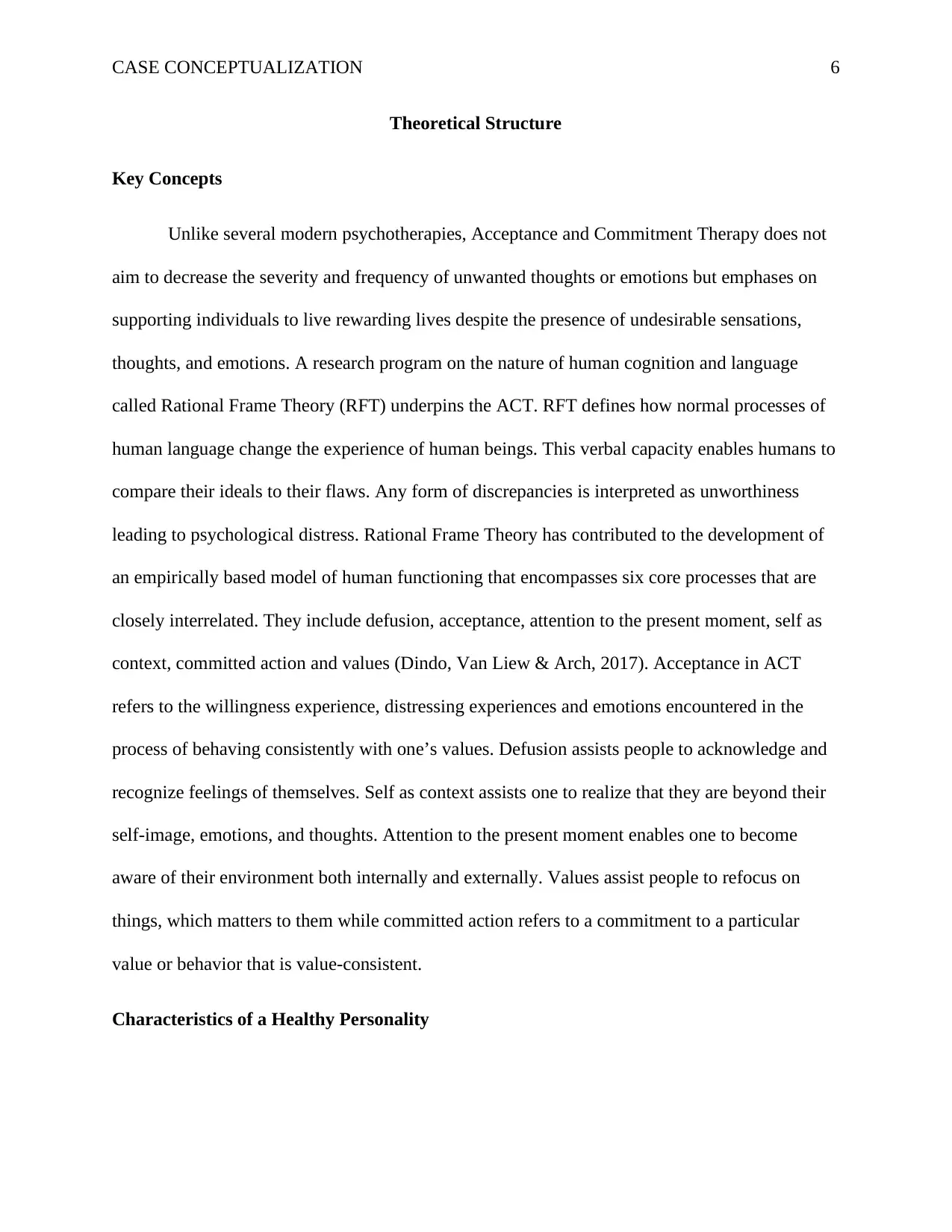
CASE CONCEPTUALIZATION 6
Theoretical Structure
Key Concepts
Unlike several modern psychotherapies, Acceptance and Commitment Therapy does not
aim to decrease the severity and frequency of unwanted thoughts or emotions but emphases on
supporting individuals to live rewarding lives despite the presence of undesirable sensations,
thoughts, and emotions. A research program on the nature of human cognition and language
called Rational Frame Theory (RFT) underpins the ACT. RFT defines how normal processes of
human language change the experience of human beings. This verbal capacity enables humans to
compare their ideals to their flaws. Any form of discrepancies is interpreted as unworthiness
leading to psychological distress. Rational Frame Theory has contributed to the development of
an empirically based model of human functioning that encompasses six core processes that are
closely interrelated. They include defusion, acceptance, attention to the present moment, self as
context, committed action and values (Dindo, Van Liew & Arch, 2017). Acceptance in ACT
refers to the willingness experience, distressing experiences and emotions encountered in the
process of behaving consistently with one’s values. Defusion assists people to acknowledge and
recognize feelings of themselves. Self as context assists one to realize that they are beyond their
self-image, emotions, and thoughts. Attention to the present moment enables one to become
aware of their environment both internally and externally. Values assist people to refocus on
things, which matters to them while committed action refers to a commitment to a particular
value or behavior that is value-consistent.
Characteristics of a Healthy Personality
Theoretical Structure
Key Concepts
Unlike several modern psychotherapies, Acceptance and Commitment Therapy does not
aim to decrease the severity and frequency of unwanted thoughts or emotions but emphases on
supporting individuals to live rewarding lives despite the presence of undesirable sensations,
thoughts, and emotions. A research program on the nature of human cognition and language
called Rational Frame Theory (RFT) underpins the ACT. RFT defines how normal processes of
human language change the experience of human beings. This verbal capacity enables humans to
compare their ideals to their flaws. Any form of discrepancies is interpreted as unworthiness
leading to psychological distress. Rational Frame Theory has contributed to the development of
an empirically based model of human functioning that encompasses six core processes that are
closely interrelated. They include defusion, acceptance, attention to the present moment, self as
context, committed action and values (Dindo, Van Liew & Arch, 2017). Acceptance in ACT
refers to the willingness experience, distressing experiences and emotions encountered in the
process of behaving consistently with one’s values. Defusion assists people to acknowledge and
recognize feelings of themselves. Self as context assists one to realize that they are beyond their
self-image, emotions, and thoughts. Attention to the present moment enables one to become
aware of their environment both internally and externally. Values assist people to refocus on
things, which matters to them while committed action refers to a commitment to a particular
value or behavior that is value-consistent.
Characteristics of a Healthy Personality
⊘ This is a preview!⊘
Do you want full access?
Subscribe today to unlock all pages.

Trusted by 1+ million students worldwide
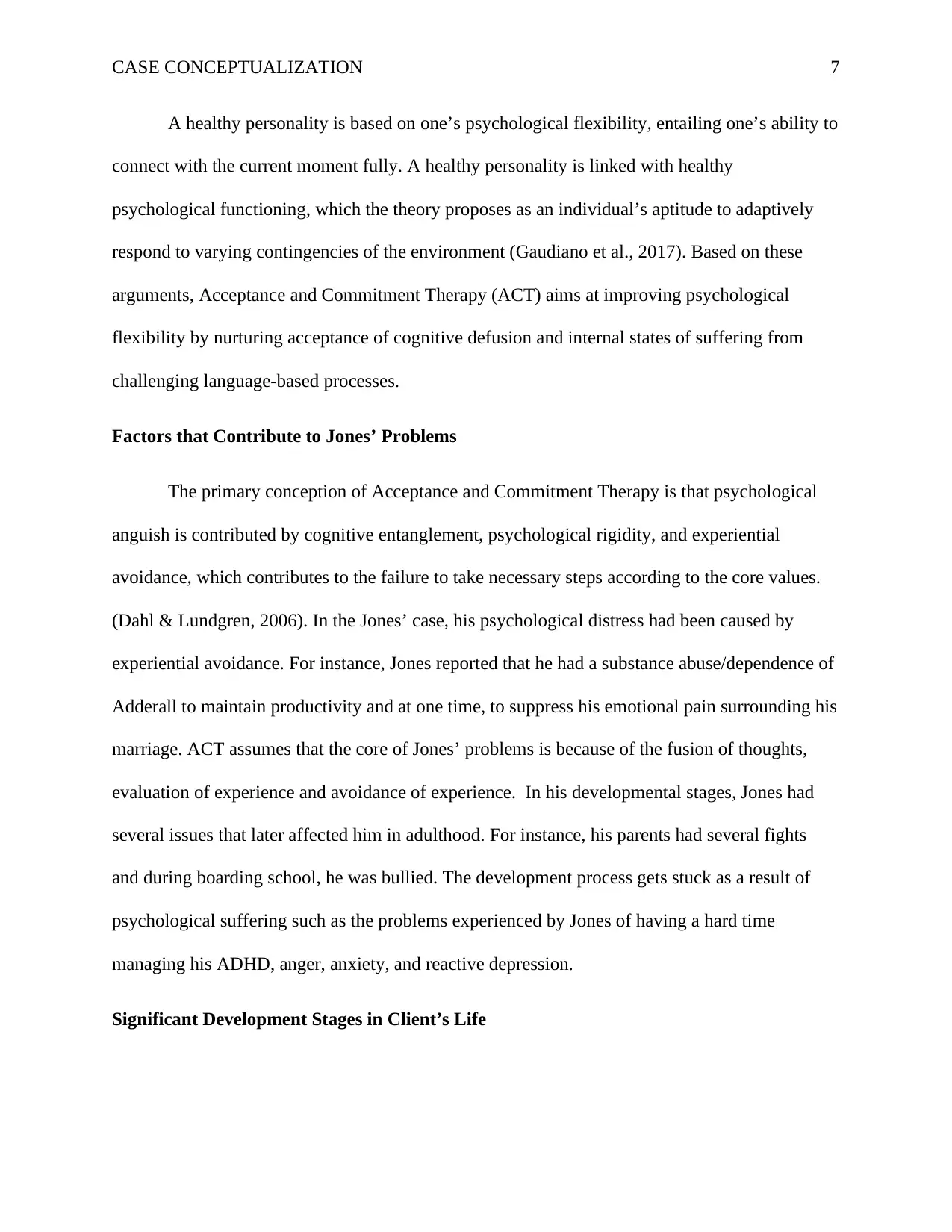
CASE CONCEPTUALIZATION 7
A healthy personality is based on one’s psychological flexibility, entailing one’s ability to
connect with the current moment fully. A healthy personality is linked with healthy
psychological functioning, which the theory proposes as an individual’s aptitude to adaptively
respond to varying contingencies of the environment (Gaudiano et al., 2017). Based on these
arguments, Acceptance and Commitment Therapy (ACT) aims at improving psychological
flexibility by nurturing acceptance of cognitive defusion and internal states of suffering from
challenging language-based processes.
Factors that Contribute to Jones’ Problems
The primary conception of Acceptance and Commitment Therapy is that psychological
anguish is contributed by cognitive entanglement, psychological rigidity, and experiential
avoidance, which contributes to the failure to take necessary steps according to the core values.
(Dahl & Lundgren, 2006). In the Jones’ case, his psychological distress had been caused by
experiential avoidance. For instance, Jones reported that he had a substance abuse/dependence of
Adderall to maintain productivity and at one time, to suppress his emotional pain surrounding his
marriage. ACT assumes that the core of Jones’ problems is because of the fusion of thoughts,
evaluation of experience and avoidance of experience. In his developmental stages, Jones had
several issues that later affected him in adulthood. For instance, his parents had several fights
and during boarding school, he was bullied. The development process gets stuck as a result of
psychological suffering such as the problems experienced by Jones of having a hard time
managing his ADHD, anger, anxiety, and reactive depression.
Significant Development Stages in Client’s Life
A healthy personality is based on one’s psychological flexibility, entailing one’s ability to
connect with the current moment fully. A healthy personality is linked with healthy
psychological functioning, which the theory proposes as an individual’s aptitude to adaptively
respond to varying contingencies of the environment (Gaudiano et al., 2017). Based on these
arguments, Acceptance and Commitment Therapy (ACT) aims at improving psychological
flexibility by nurturing acceptance of cognitive defusion and internal states of suffering from
challenging language-based processes.
Factors that Contribute to Jones’ Problems
The primary conception of Acceptance and Commitment Therapy is that psychological
anguish is contributed by cognitive entanglement, psychological rigidity, and experiential
avoidance, which contributes to the failure to take necessary steps according to the core values.
(Dahl & Lundgren, 2006). In the Jones’ case, his psychological distress had been caused by
experiential avoidance. For instance, Jones reported that he had a substance abuse/dependence of
Adderall to maintain productivity and at one time, to suppress his emotional pain surrounding his
marriage. ACT assumes that the core of Jones’ problems is because of the fusion of thoughts,
evaluation of experience and avoidance of experience. In his developmental stages, Jones had
several issues that later affected him in adulthood. For instance, his parents had several fights
and during boarding school, he was bullied. The development process gets stuck as a result of
psychological suffering such as the problems experienced by Jones of having a hard time
managing his ADHD, anger, anxiety, and reactive depression.
Significant Development Stages in Client’s Life
Paraphrase This Document
Need a fresh take? Get an instant paraphrase of this document with our AI Paraphraser
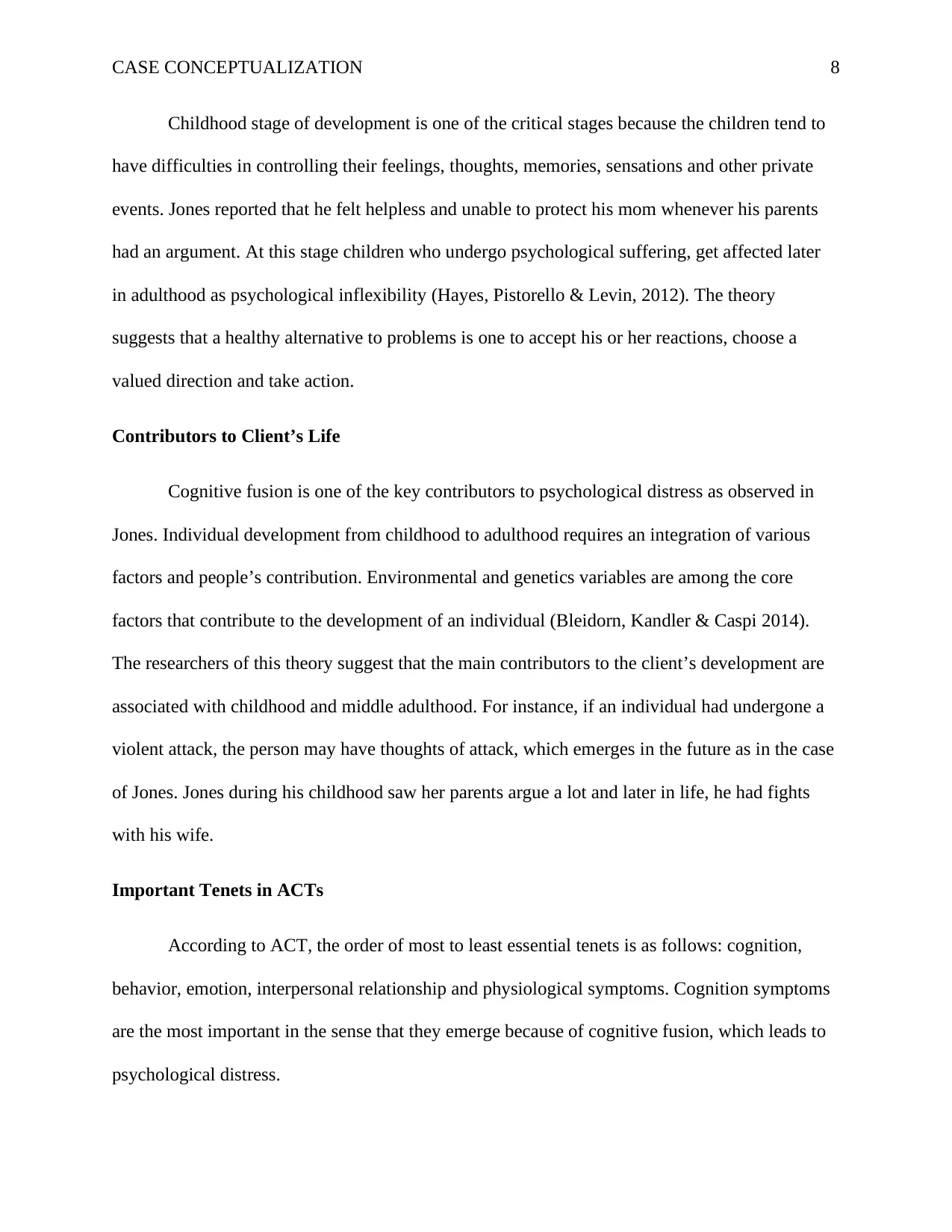
CASE CONCEPTUALIZATION 8
Childhood stage of development is one of the critical stages because the children tend to
have difficulties in controlling their feelings, thoughts, memories, sensations and other private
events. Jones reported that he felt helpless and unable to protect his mom whenever his parents
had an argument. At this stage children who undergo psychological suffering, get affected later
in adulthood as psychological inflexibility (Hayes, Pistorello & Levin, 2012). The theory
suggests that a healthy alternative to problems is one to accept his or her reactions, choose a
valued direction and take action.
Contributors to Client’s Life
Cognitive fusion is one of the key contributors to psychological distress as observed in
Jones. Individual development from childhood to adulthood requires an integration of various
factors and people’s contribution. Environmental and genetics variables are among the core
factors that contribute to the development of an individual (Bleidorn, Kandler & Caspi 2014).
The researchers of this theory suggest that the main contributors to the client’s development are
associated with childhood and middle adulthood. For instance, if an individual had undergone a
violent attack, the person may have thoughts of attack, which emerges in the future as in the case
of Jones. Jones during his childhood saw her parents argue a lot and later in life, he had fights
with his wife.
Important Tenets in ACTs
According to ACT, the order of most to least essential tenets is as follows: cognition,
behavior, emotion, interpersonal relationship and physiological symptoms. Cognition symptoms
are the most important in the sense that they emerge because of cognitive fusion, which leads to
psychological distress.
Childhood stage of development is one of the critical stages because the children tend to
have difficulties in controlling their feelings, thoughts, memories, sensations and other private
events. Jones reported that he felt helpless and unable to protect his mom whenever his parents
had an argument. At this stage children who undergo psychological suffering, get affected later
in adulthood as psychological inflexibility (Hayes, Pistorello & Levin, 2012). The theory
suggests that a healthy alternative to problems is one to accept his or her reactions, choose a
valued direction and take action.
Contributors to Client’s Life
Cognitive fusion is one of the key contributors to psychological distress as observed in
Jones. Individual development from childhood to adulthood requires an integration of various
factors and people’s contribution. Environmental and genetics variables are among the core
factors that contribute to the development of an individual (Bleidorn, Kandler & Caspi 2014).
The researchers of this theory suggest that the main contributors to the client’s development are
associated with childhood and middle adulthood. For instance, if an individual had undergone a
violent attack, the person may have thoughts of attack, which emerges in the future as in the case
of Jones. Jones during his childhood saw her parents argue a lot and later in life, he had fights
with his wife.
Important Tenets in ACTs
According to ACT, the order of most to least essential tenets is as follows: cognition,
behavior, emotion, interpersonal relationship and physiological symptoms. Cognition symptoms
are the most important in the sense that they emerge because of cognitive fusion, which leads to
psychological distress.
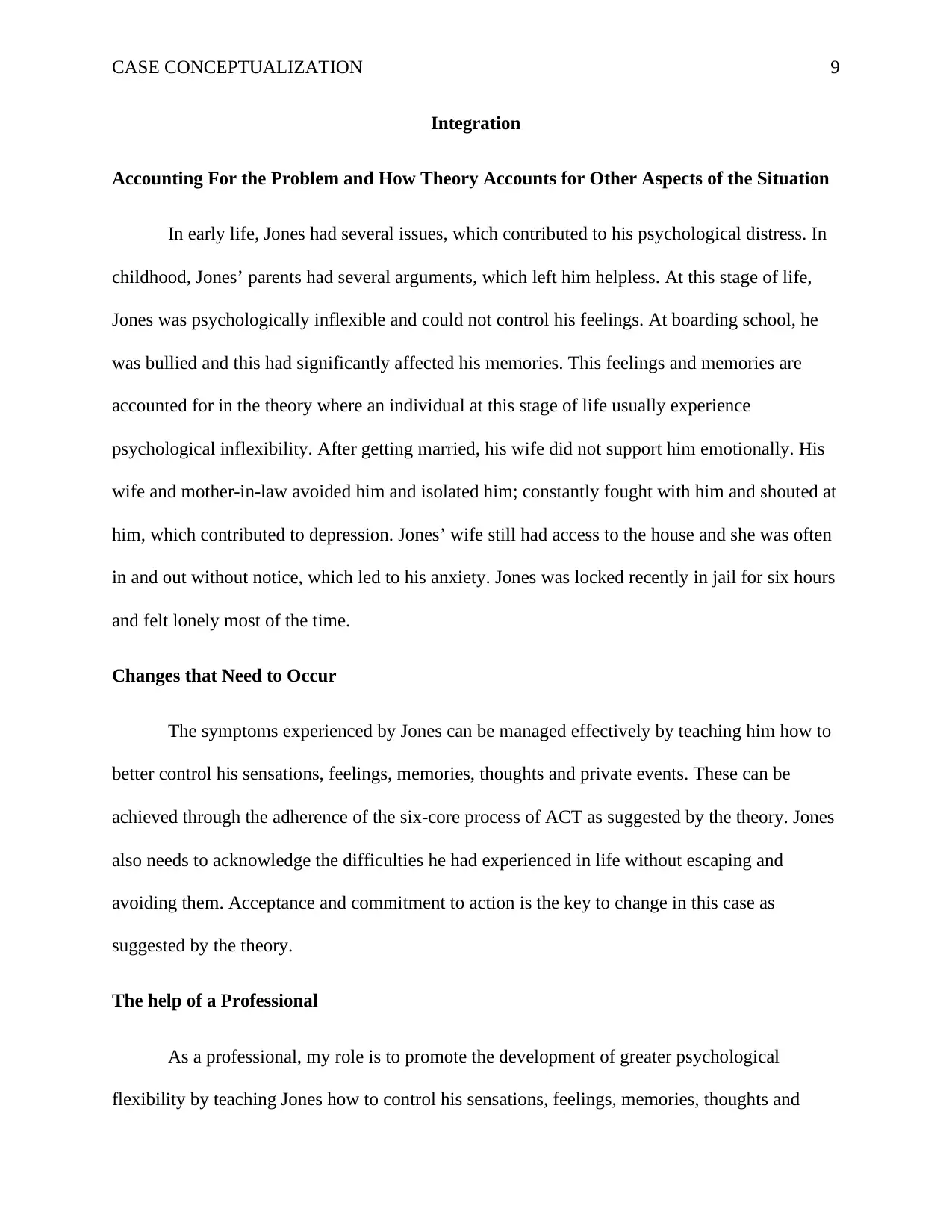
CASE CONCEPTUALIZATION 9
Integration
Accounting For the Problem and How Theory Accounts for Other Aspects of the Situation
In early life, Jones had several issues, which contributed to his psychological distress. In
childhood, Jones’ parents had several arguments, which left him helpless. At this stage of life,
Jones was psychologically inflexible and could not control his feelings. At boarding school, he
was bullied and this had significantly affected his memories. This feelings and memories are
accounted for in the theory where an individual at this stage of life usually experience
psychological inflexibility. After getting married, his wife did not support him emotionally. His
wife and mother-in-law avoided him and isolated him; constantly fought with him and shouted at
him, which contributed to depression. Jones’ wife still had access to the house and she was often
in and out without notice, which led to his anxiety. Jones was locked recently in jail for six hours
and felt lonely most of the time.
Changes that Need to Occur
The symptoms experienced by Jones can be managed effectively by teaching him how to
better control his sensations, feelings, memories, thoughts and private events. These can be
achieved through the adherence of the six-core process of ACT as suggested by the theory. Jones
also needs to acknowledge the difficulties he had experienced in life without escaping and
avoiding them. Acceptance and commitment to action is the key to change in this case as
suggested by the theory.
The help of a Professional
As a professional, my role is to promote the development of greater psychological
flexibility by teaching Jones how to control his sensations, feelings, memories, thoughts and
Integration
Accounting For the Problem and How Theory Accounts for Other Aspects of the Situation
In early life, Jones had several issues, which contributed to his psychological distress. In
childhood, Jones’ parents had several arguments, which left him helpless. At this stage of life,
Jones was psychologically inflexible and could not control his feelings. At boarding school, he
was bullied and this had significantly affected his memories. This feelings and memories are
accounted for in the theory where an individual at this stage of life usually experience
psychological inflexibility. After getting married, his wife did not support him emotionally. His
wife and mother-in-law avoided him and isolated him; constantly fought with him and shouted at
him, which contributed to depression. Jones’ wife still had access to the house and she was often
in and out without notice, which led to his anxiety. Jones was locked recently in jail for six hours
and felt lonely most of the time.
Changes that Need to Occur
The symptoms experienced by Jones can be managed effectively by teaching him how to
better control his sensations, feelings, memories, thoughts and private events. These can be
achieved through the adherence of the six-core process of ACT as suggested by the theory. Jones
also needs to acknowledge the difficulties he had experienced in life without escaping and
avoiding them. Acceptance and commitment to action is the key to change in this case as
suggested by the theory.
The help of a Professional
As a professional, my role is to promote the development of greater psychological
flexibility by teaching Jones how to control his sensations, feelings, memories, thoughts and
⊘ This is a preview!⊘
Do you want full access?
Subscribe today to unlock all pages.

Trusted by 1+ million students worldwide
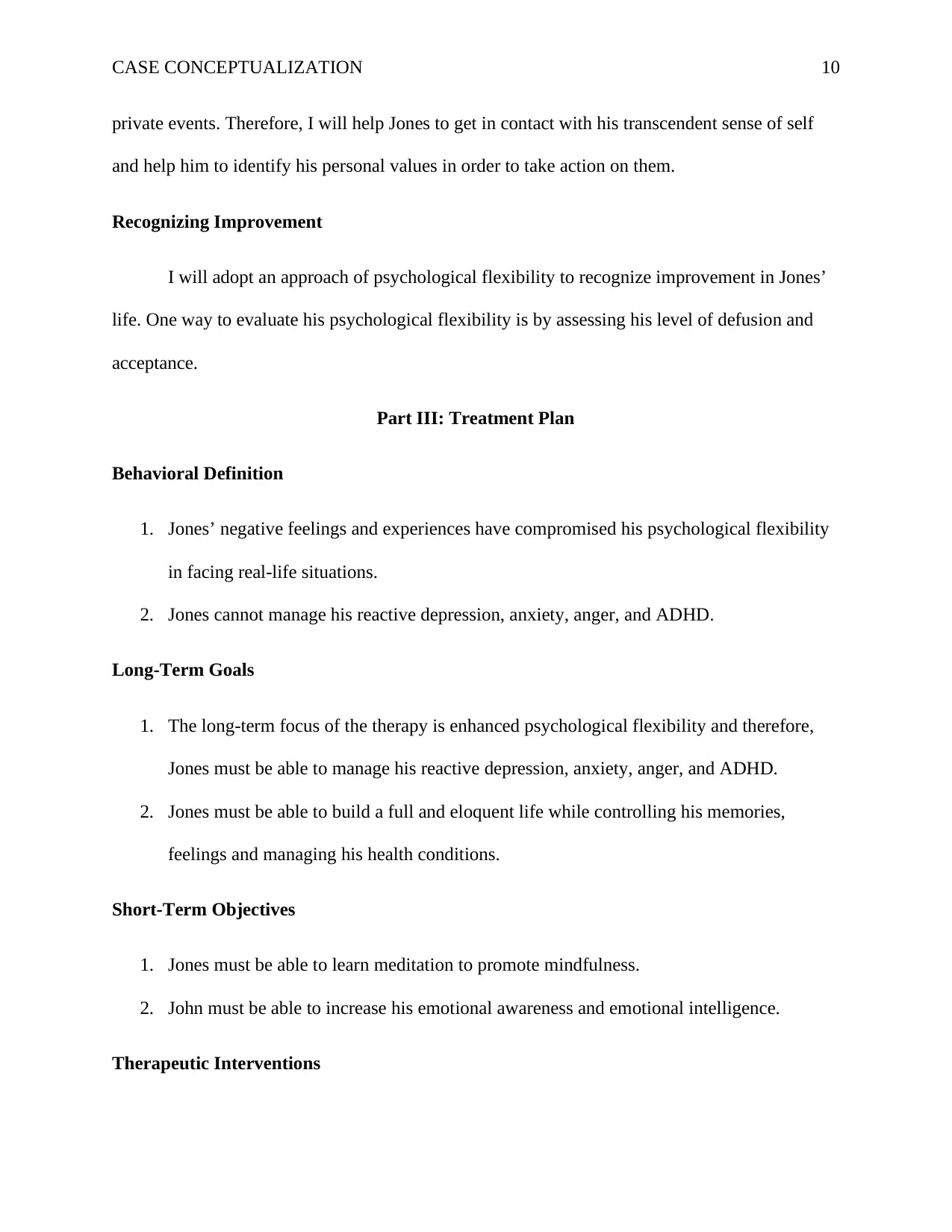
CASE CONCEPTUALIZATION 10
private events. Therefore, I will help Jones to get in contact with his transcendent sense of self
and help him to identify his personal values in order to take action on them.
Recognizing Improvement
I will adopt an approach of psychological flexibility to recognize improvement in Jones’
life. One way to evaluate his psychological flexibility is by assessing his level of defusion and
acceptance.
Part III: Treatment Plan
Behavioral Definition
1. Jones’ negative feelings and experiences have compromised his psychological flexibility
in facing real-life situations.
2. Jones cannot manage his reactive depression, anxiety, anger, and ADHD.
Long-Term Goals
1. The long-term focus of the therapy is enhanced psychological flexibility and therefore,
Jones must be able to manage his reactive depression, anxiety, anger, and ADHD.
2. Jones must be able to build a full and eloquent life while controlling his memories,
feelings and managing his health conditions.
Short-Term Objectives
1. Jones must be able to learn meditation to promote mindfulness.
2. John must be able to increase his emotional awareness and emotional intelligence.
Therapeutic Interventions
private events. Therefore, I will help Jones to get in contact with his transcendent sense of self
and help him to identify his personal values in order to take action on them.
Recognizing Improvement
I will adopt an approach of psychological flexibility to recognize improvement in Jones’
life. One way to evaluate his psychological flexibility is by assessing his level of defusion and
acceptance.
Part III: Treatment Plan
Behavioral Definition
1. Jones’ negative feelings and experiences have compromised his psychological flexibility
in facing real-life situations.
2. Jones cannot manage his reactive depression, anxiety, anger, and ADHD.
Long-Term Goals
1. The long-term focus of the therapy is enhanced psychological flexibility and therefore,
Jones must be able to manage his reactive depression, anxiety, anger, and ADHD.
2. Jones must be able to build a full and eloquent life while controlling his memories,
feelings and managing his health conditions.
Short-Term Objectives
1. Jones must be able to learn meditation to promote mindfulness.
2. John must be able to increase his emotional awareness and emotional intelligence.
Therapeutic Interventions
Paraphrase This Document
Need a fresh take? Get an instant paraphrase of this document with our AI Paraphraser

CASE CONCEPTUALIZATION 11
1. The counselor will help the client to develop greater psychological flexibility aimed at
making it easier for him to manage his ADHD, anger, anxiety, and reactive depression.
2. The counselor will help the client to clarify his personal values and take action on them.
1. The counselor will help the client to develop greater psychological flexibility aimed at
making it easier for him to manage his ADHD, anger, anxiety, and reactive depression.
2. The counselor will help the client to clarify his personal values and take action on them.
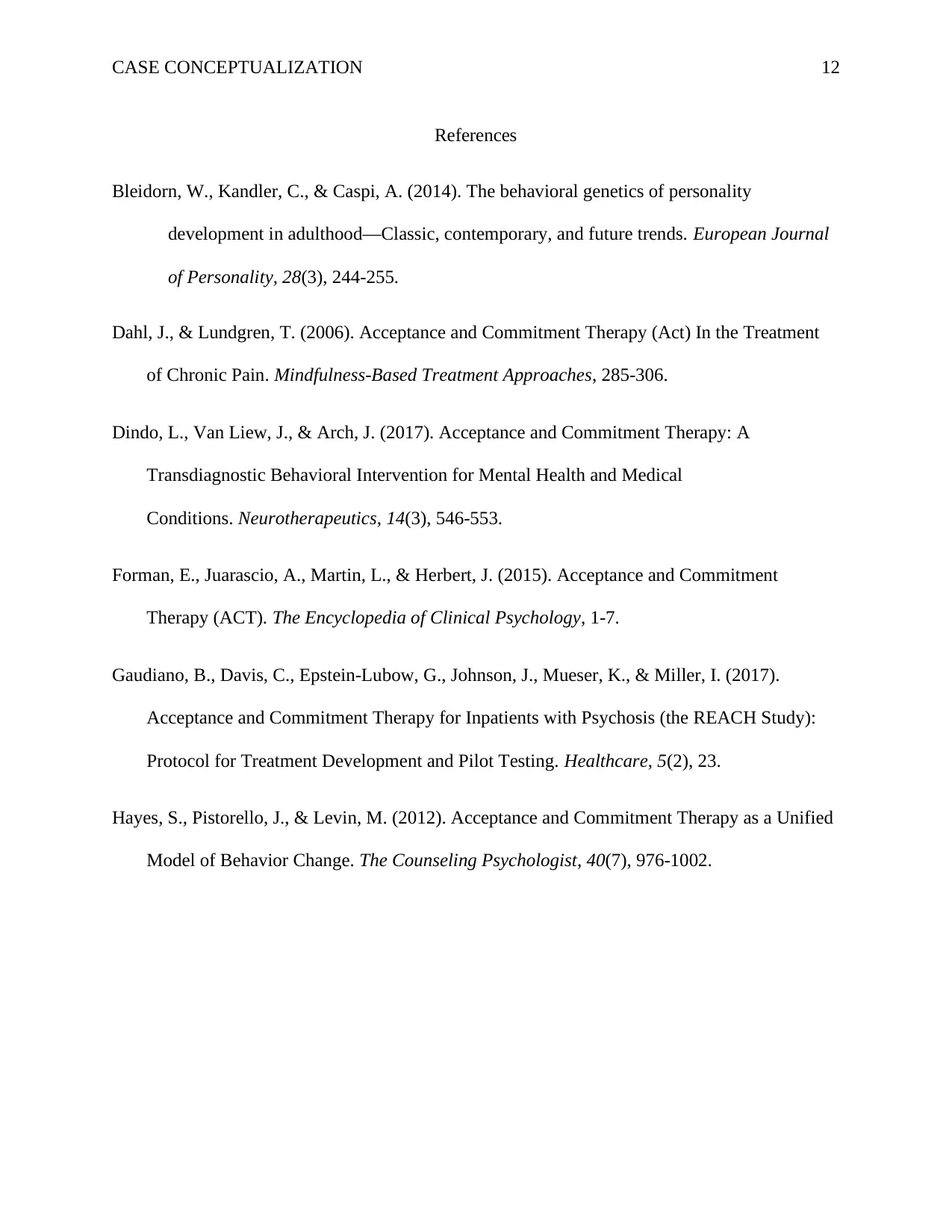
CASE CONCEPTUALIZATION 12
References
Bleidorn, W., Kandler, C., & Caspi, A. (2014). The behavioral genetics of personality
development in adulthood—Classic, contemporary, and future trends. European Journal
of Personality, 28(3), 244-255.
Dahl, J., & Lundgren, T. (2006). Acceptance and Commitment Therapy (Act) In the Treatment
of Chronic Pain. Mindfulness-Based Treatment Approaches, 285-306.
Dindo, L., Van Liew, J., & Arch, J. (2017). Acceptance and Commitment Therapy: A
Transdiagnostic Behavioral Intervention for Mental Health and Medical
Conditions. Neurotherapeutics, 14(3), 546-553.
Forman, E., Juarascio, A., Martin, L., & Herbert, J. (2015). Acceptance and Commitment
Therapy (ACT). The Encyclopedia of Clinical Psychology, 1-7.
Gaudiano, B., Davis, C., Epstein-Lubow, G., Johnson, J., Mueser, K., & Miller, I. (2017).
Acceptance and Commitment Therapy for Inpatients with Psychosis (the REACH Study):
Protocol for Treatment Development and Pilot Testing. Healthcare, 5(2), 23.
Hayes, S., Pistorello, J., & Levin, M. (2012). Acceptance and Commitment Therapy as a Unified
Model of Behavior Change. The Counseling Psychologist, 40(7), 976-1002.
References
Bleidorn, W., Kandler, C., & Caspi, A. (2014). The behavioral genetics of personality
development in adulthood—Classic, contemporary, and future trends. European Journal
of Personality, 28(3), 244-255.
Dahl, J., & Lundgren, T. (2006). Acceptance and Commitment Therapy (Act) In the Treatment
of Chronic Pain. Mindfulness-Based Treatment Approaches, 285-306.
Dindo, L., Van Liew, J., & Arch, J. (2017). Acceptance and Commitment Therapy: A
Transdiagnostic Behavioral Intervention for Mental Health and Medical
Conditions. Neurotherapeutics, 14(3), 546-553.
Forman, E., Juarascio, A., Martin, L., & Herbert, J. (2015). Acceptance and Commitment
Therapy (ACT). The Encyclopedia of Clinical Psychology, 1-7.
Gaudiano, B., Davis, C., Epstein-Lubow, G., Johnson, J., Mueser, K., & Miller, I. (2017).
Acceptance and Commitment Therapy for Inpatients with Psychosis (the REACH Study):
Protocol for Treatment Development and Pilot Testing. Healthcare, 5(2), 23.
Hayes, S., Pistorello, J., & Levin, M. (2012). Acceptance and Commitment Therapy as a Unified
Model of Behavior Change. The Counseling Psychologist, 40(7), 976-1002.
⊘ This is a preview!⊘
Do you want full access?
Subscribe today to unlock all pages.

Trusted by 1+ million students worldwide
1 out of 12
Related Documents
Your All-in-One AI-Powered Toolkit for Academic Success.
+13062052269
info@desklib.com
Available 24*7 on WhatsApp / Email
![[object Object]](/_next/static/media/star-bottom.7253800d.svg)
Unlock your academic potential
Copyright © 2020–2025 A2Z Services. All Rights Reserved. Developed and managed by ZUCOL.





